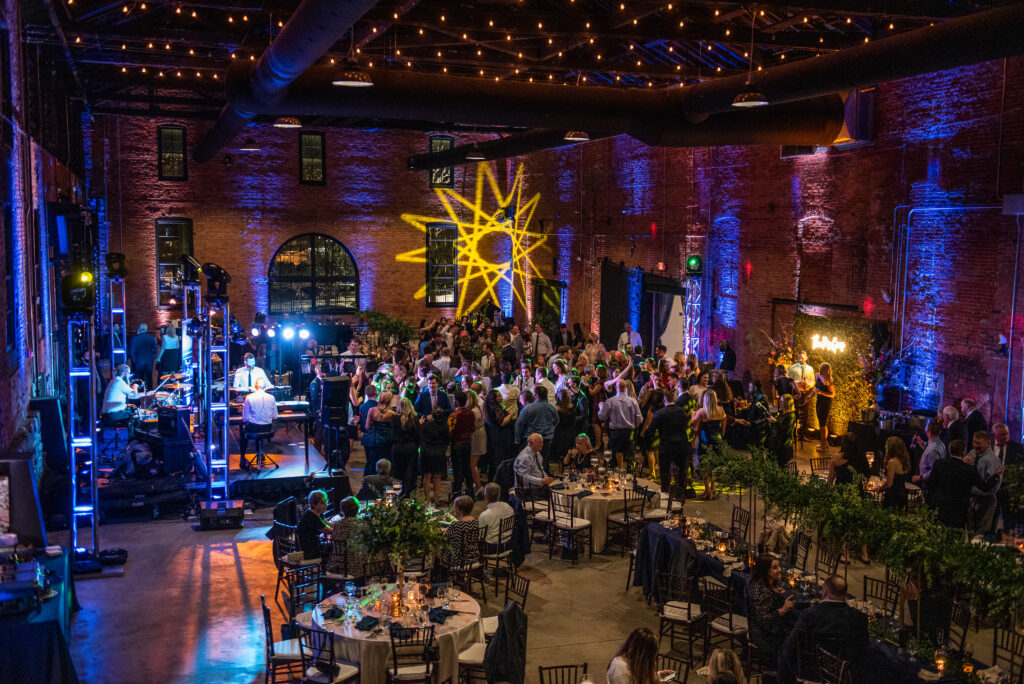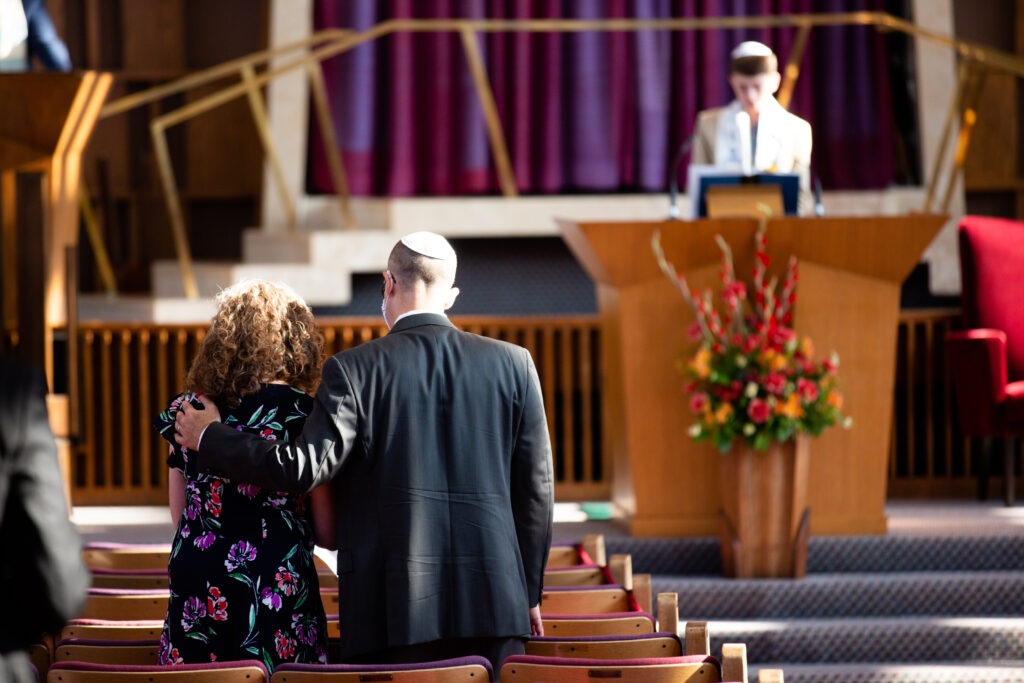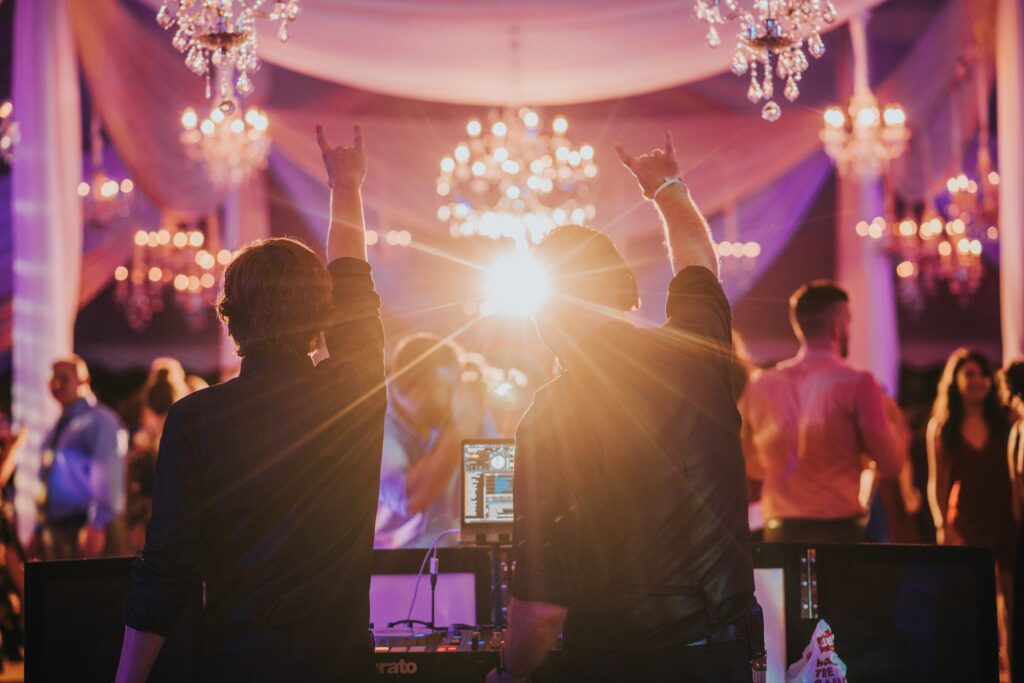By Amanda Koehn
You’ve just started planning your wedding or child’s b’nai mitzvah. Choosing a venue and important vendors like a photographer, caterer and entertainment likely top your list for establishing the look and feel of the big day.
But how do you decide who to hire? You’ll have to consider things like budget and location, and ask the right questions to determine who is best to partner with to bring to life the vision for your event. For that reason, Celebrations interviewed local professionals about the right questions to ask and what to expect in the process.

Venue and catering
When selecting a venue and catering – typically the first aspects of an event to be decided – it’s important to establish the atmosphere you wish to create and how the food may complement that vision.
Joan Rosenthal is the founder and CEO of Tenk West Bank, a converted warehouse event venue along the West Bank of the Flats in Cleveland, and Marigold Catering + Events, a catering and design company that serves Tenk and several other venues – including being the exclusive caterer for the Cleveland Botanical Garden. She says interested clients usually reach out online. They then are connected to an event planner who takes them from “start to finish” – from visiting venues and choosing a menu to the big day, Rosenthal says.
Early in the venue selection process, it’s important for the client and planner to decide what kind of space fits their vision, Rosenthal explains.
“For example, Tenk is a very industrial look and so (we have) to gauge their interest in the style of the venue,” she says.
Similarly, at Park Synagogue, which recently opened its newly constructed community hall in its Pepper Pike building, the process typically starts with finding a date that works for everyone and then figuring out the budget, says Stuart Deicher, Park Synagogue’s executive director.
“It’s really just a matter of sitting down and having a conversation of what someone is looking for and what their expectations are,” he says.
For the catering aspect, those conversations also involve determining whether there will be a sit-down meal or food stations. At Park Synagogue, it’s also important to decide between a meat or dairy meal, Deicher explains. For children celebrating b’nai mitzvahs, there may be additional questions about kid-friendly food options.
“It always comes down to the same questions: what is it going to cost me, and what am I going to get?” he says.
For Marigold’s catering, Rosenthal says clients select from a “large platform of menus” and then schedule a tasting.
“Budget is the most important question,” she says. “For example, we are one of the more expensive caterers, and so we have to make sure the client can fit within the budget parameters that we have.”
Overall, the client’s questions guide the whole process, Rosenthal says, so it’s important to come prepared to envision your event.
“You go into a venue and it’s empty,” she says of the initial visit. “It’s very difficult to create the vision. So, we’ve got 10 different (photo) books that show different parties, we introduce them to production companies and bands and florists. … We kind of guide the whole process.”
And the question-and-answer process is a two-way street, Deicher says. He and his team will guide celebrants if they don’t know what to ask.
“It really becomes a dialogue,” he says. “It becomes a give and take, or back and forth.”
Key questions to ask yourself:
- What atmosphere am I looking to create with the space, and what kind of food should go with it?
Key questions to ask a potential venue/caterer:
- Does the venue’s capacity align with my intended guest list?
- Are kitchens on site?
- What types of menu options are there?
- Is the food prepared fresh?
- What is the process for food tasting ahead of the event?
- What is the total cost, and, are there any unexpected or hidden costs to anticipate?
- Is there parking on site?
- What kind of transportation options are there to and from the venue for guests?
- What nearby hotels do you recommend?
- Can you share photos of different style events in your space?
- What hours would we have the space(s) for?
- If I’m planning to use a venue’s outdoor spaces, is there a backup location for inclement weather?
- What kind of kid-friendly food options are there?

Photography
When determining which photographer to hire, the key is selecting someone whose work you love and who you enjoy being around, says Lindsey Beckwith, owner of Lindsey Beckwith Photography, which serves the Cleveland area. Her first step is meeting interested clients in person.
“There are plenty photographers, you will find one that speaks to you,” she says. “… So, do you love the work and then, do you vibe with them personally? Because the more comfortable you are with your photographer, the more personal and authentic the photos will be.”
She recommends asking questions that get at what it is like to work with the photographer – their style of photography, how hands-on they are, their experience with different and dark lighting, and how they handle family portraits. Perhaps, you could ask them to walk you through how they envision being part of the day from the start to finish.
“The photographer kind of keeps things on track almost behind the scenes,” she says. “I feel like it’s my job to keep people on time without them realizing it.”
The photographer has to keep the timeline of the day top of mind, while also being someone with whom you feel comfortable sharing intimate moments. They may be nearby while you are getting dressed and will manage your family during the family portrait portion.
“You have to think you are hiring a person to be around you all day,” she says. “… What kind of experience are you going to have with that person?”
And, interviews go both ways between photographers and potential clients, she explains.
“At this point in my career, I’m interested in finding clients who can let me do my best work,” she says. “I love it when they ask questions because it lets me see what they’re thinking, it gives me insight into what type of photography is going to be good for them.”
Key questions to ask yourself:
- What style of photography am I looking for?
- Does the photographer I’m meeting with have a personality that vibes with me? Do I feel comfortable and excited about them being such a big part of my special day?
Key questions to ask a potential photographer:
- Walk me through what it is like to work with you on a wedding or b’nai mitzvah. How do you envision being part of the day?
- On a scale from working behind the scenes to being very hands on, where do you think you fit?
- What is the total cost, and, are there any unexpected or hidden costs to anticipate?
- What do I get for this cost, and when can I expect to receive it?
- Do you have experience with off-camera flash or shooting in dark spaces (or any other specific setting)? Can you provide examples?
- How do you handle family portraits?
- Tip: If there’s anything specific or unusual you want documented in a certain way, ask for examples from their past work that may be similar.

Entertainment
When seeking entertainers for an event, it’s important that who you hire fits the musical styles and energy level you envision.
Eric Smith, vice president of sales and talent specialist at Cleveland Music Group, says as a DJ, he encourages clients to share specific genres or artists they would like played during certain portions of the event. That allows him to build creative playlists specific to each party – be it a b’nai mitzvah, wedding or other event.
People should incorporate music they typically enjoy into their party, rather than playing whatever might be the norm for such events but is not their style, he explains. “If you don’t listen to Frank Sinatra in your daily life, why would you listen to him on your wedding day?” The same is true for an 80’s or 90’s artist for a b’nai mitzvah, unless it was a well-known party-type song.
Cleveland Music Group represents and organizes booking for a range of live bands, DJs/emcees, jazz ensembles, ceremony musicians, specialty acts and more. Smith and his team will often talk with potential clients via email, phone or video chat to determine what acts fit their vision and are available for their date. Once the client chooses the entertainer, they will work with that specific group throughout the planning process, Smith says.
One important question to ask is whether the band knows or can learn specific songs you want played – you can always ask, even if your song isn’t on their list, he notes.
For wedding bands, Smith notes two varieties: a party band, which usually does shorter performances with a focus on the party and newer music; and a classic band, which often has more members and does a longer performance with more classic and slower songs, even during the dinner portion.
Moreover, for bands, you’ll want to find out whether a prospect is an actual band that regularly plays together, or whether they are individual musicians grouped together by a company for your event only – perhaps practicing together only for a minimal amount of time before. Cleveland Music Group represents actual bands, he specifies.
“That’s something we are trying to educate people on a lot in the last couple years because (companies placing random musicians together) is growing unfortunately in popularity, and they have really good marketing,” he says.
He recommends asking questions such as how long the band has played together and when its most recent personnel change took place.
For DJs, there are also two general types: club style DJs and classic wedding DJs, he explains. His company encourages interviewing DJs prior to hiring them to ensure it’s a personality match. The DJ will be “running the event once the reception starts,” and them being creative and having fun will make for a more fun party, he says. They can even get innovative during weddings’ cocktail and dinner portions.
“A lot of times, brides and grooms listen to music that isn’t necessarily going to get played during dancing, but they still want to hear that music,” Smith says. “I’ve had some awesome cocktail playlists. One couple wanted ‘80s ballads and another wanted only ‘90s one-hit wonders.”
He also notes that while some may want to micromanage the evening’s timeline, a good DJ or emcee will make sure it goes smoothly without having to rush around or people getting bored, which is important for keeping wedding and b’nai mitzvah guests entertained throughout the event.
“They are giving me the tools I need to make it the best night for them, but the biggest part of that is just trusting that I’m going to do that,” he says.
Key questions to ask yourself:
- What kind of music, band, DJ or entertainment do I envision?
Key questions to ask potential entertainment providers:
- How long has the band played together? When was the last personnel change within the band?
- Ask to view their current song list and about specific songs you may want played for a formal dance.
- Have you played at my venue before?
- What is the total cost, and, are there any unexpected or hidden costs to anticipate? What do I get for this cost?
- What are your backup plans in case any issues come up?
- Do you have insurance?
- Do you take requests?
- Do you allow a do-not-play list?
- How do you handle cocktail and dinner music versus dancing music? Do you allow clients to select specific genres or artists to play for those portions?
